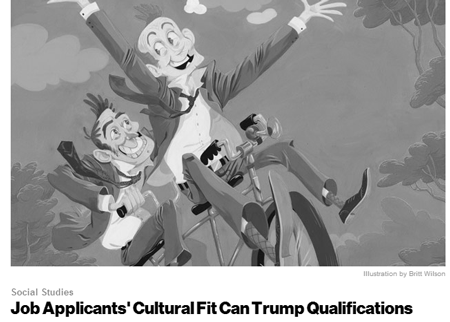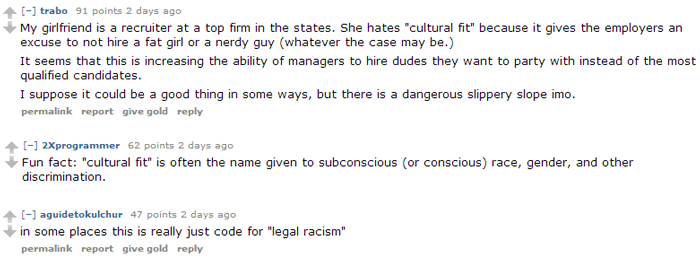Frustrated. Disturbed. Disappointed.
That’s how I feel after reading a recent article that appeared in Bloomberg Businessweek called “Job Applicants’ Cultural Fit Can Trump Qualifications.” I don’t typically like to rant against stuff on the web, but I’m worried this is a case where the popularity of the piece (note the thousand upvotes, 600+ comments, and hyper-negativity in the Reddit thread) and the lack of response is giving a wonderful thing – company culture and cultural fit – an undefended bad name.

Let’s be clear; these things ARE NOT company culture:
- Secret Santa gift exchanges
- Karaoke nights
- Bean bag chairs
- Nerf gun fights
- Catered lunches
- Cruises with your co-workers
- Mashed potato sculpting contests judged by your auditors at Deloitte (yes, we really did this at Moz, and it was totally fun)
Those are fun things people who work together might have or do. They may be indicative of a certain type of workplace environment. They may even stem from the culture that’s been created. But, they are NOT company culture.
Just like these questions ARE NOT effective or useful in determining cultural fit:
- If you could pick one person to play you in a movie, who would it be?
- What are the top 5 cities you want to go to and why?
- Where do you vacation in the summer?
- What’s your favorite movie?
- What’s the last book you read for fun?
- Do you rock climb, play the cello, or enjoy film noir?
- Star Wars or Star Trek?
I’m scared that this is how the emerging conversation around company culture and finding cultural fits for startups and teams is being portrayed. If this mentality sinks in, and if this is the “brand” that culture develops outside the echo chamber of tech startups, we’re all going to suffer for it. I’m scared that the comment below (from the aforementioned Reddit thread) will become how many people perceive what I think is a great trend:

I believe strongly in company culture. I didn’t for the first 6 years of my professional career, but now that I’ve felt the pain of those times, and seen that same pain reflected in so many other companies, and heard that pain described by so many people who’ve come to Moz, I’m a believer. But what I believe in is nothing like what’s in the Bloomberg piece. Thus, I wanted to try to put the record straight.
NOTE: My definition of company culture and cultural fit may not be the same as yours. Differing opinions are OK, but my experience has been that when startup investors, CEOs, and employees talk about culture, it’s much more like what I’m going to describe below than what was portrayed in that article.
Your company’s culture is three big things:
- Your values – those you state with words and those you exhibit through your actions
- Your mission & vision – the goal you’re driving toward and the force behind that goal
- Your hiring, firing, and promotion criteria – the reasons you bring people onto the team, the reasons you let them go, and the reasons you promote/reward them
If you’re trying to figure out what a company’s values really are, look at the decisions management makes when lots of money, risk, or loss of face for executives is at odds with the stated values. Want to know the company’s mission & vision? Look at what they’ve intentionally chosen not to do, even though it could be lucrative. And if you’re seeking answers to why a company hires & fires, talk to the managers about their most unorthodox hires that have worked out, and the most regret they’ve felt when letting someone go (and why).
I wish that values, mission/vision, and people decisions were always spelled out on a document, but very often, even at Moz sometimes, the actions speak louder than what’s on the mission statement or the core values list. When it’s obvious to your team and your community that the company rewards people for acting in certain ways, or punishes them for not, you should codify those actions and make their importance transparent, or realize that it’s something you don’t want as part of the culture and work to abolish it. Hiding elements of company culture is almost always an unhealthy sign.
Cultural fit should be defined by:
- Shared beliefs – the things that you collectively hold to be true about the world (e.g. good people tend to have traits like X, the right way to treat others is Y, what’s appropriate/inappropriate at work is Z).
- Shared priorities – what matters in terms of big, overarching things like work/life balance, short vs. long term commitment, how decision are made, etc.
- Stylistic cohesion – some people don’t work well together, others find themselves able and inspired to do more when surrounded by a certain type. Cohesion isn’t about finding lots of people who are the same, but about making sure there’s no one on the team that detracts from others and that many get more enjoyment and progress from the diverse perspectives their co-workers bring.
The cultural fit is actually pretty easy to sense in an interview (even if you’re the interviewee). Personalities mesh, people find themselves on the “same page,” they get excited about the problems and supportive of the people working on them, or they don’t (in which case one of all of these elements are probably missing). Certain kinds of diversity are excellent in creating a better culture – gender, background, experience, education, etc, when diverse, tend to produce interesting, productive, and fun work environments. But, diversity on beliefs (around morality or on what work should be like) or priorities (minimum viable effort vs. “there’s little else I’d rather be doing,” or “we should sell this business as soon as there’s an opportunity” vs. “let’s build for the long term”) tends to produce a lot of ugly strife.
Tragically, many of the comments, feedback on Twitter, and posts in the Reddit thread focused on a different side of what “culture fit” means:

I can’t honestly say that I don’t see their point. Cultural fit, even as its defined above, likely has some correlation with people who share similar backgrounds and upbringings. People from homogenous geographies and socio-economic groups may be more likely to share values/beliefs, priorities, and/or elements of stylistic cohesion, which could end up limiting diversity. I’m not entirely sure how to get around this problem. It’s a thorny one and it deserves more thought and effort.
However, I can say, honestly, that when used properly, “cultural fit” is not a euphemism for racial/genderor any other type of bias. And I’m proud to say that if you visit Moz today, you would find a lot of diversity – from racial background to national origin to educational status to LGBT to gender (we’re ~55% male today, but were as low as ~47% at one point last year). We may just be lucky, and certainly there are still backgrounds that are underrepresented at the company (as there are in tech as a whole and Seattle as a geography, too). But the hiring process for cultural fit is designed to build a work environment filled with lots of different kinds of people who share those fundamental beliefs.
That process should result in a place where work is more enjoyable because of how it’s done and with whom you’re sharing your days. Given the massive amount of time we’ll spend working in our adult lives, I wouldn’t trade company culture and culture fit for anything. It has a transformative power to create remarkable companies and inspire people to accomplish great things together.
I hope, in the future, fewer media outlets write about company culture like this:
Northwestern professor Lauren Rivera concludes that companies are making hiring decisions “in a manner more closely resembling the choice of friends or romantic partners.”
Or this:
“Whether someone rock climbs, plays the cello, or enjoys film noir may seem trivial,” she wrote, “but these leisure pursuits were crucial for assessing someone as a cultural fit.”
Or this:
“Especially in this slow economy, more employers are asking “Star Trek or Star Wars?” (as a programmer was recently asked by an employer) because fit is believed to be a strong predictor of employee retention.”
The last thing businesses or job seekers need is that sort of wrong-headed misinformation creating false ideas and overtaking the positive aspects company culture and culture fit can bring.
p.s. If you’re looking for more on this topic, I thought Elad Gil’s post, Never Ever Compromise Hiring for Culture Fit, was a good one.
